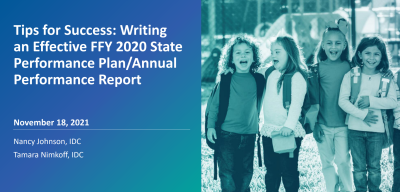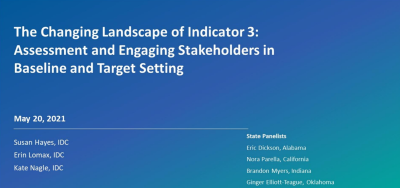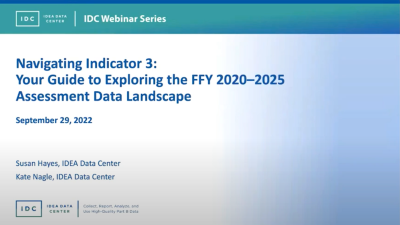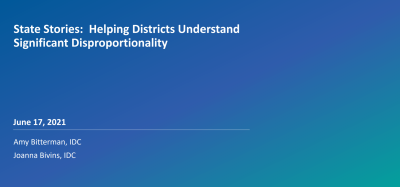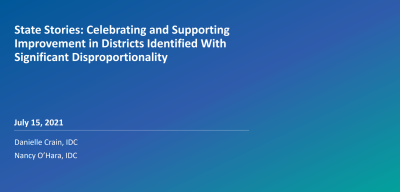Past Events and Recordings
Search for past events including the companion recordings and slides.
Past Events 8 - 14 of 69
-
Webinar Replay: Adopting an Equity Mindset for Preschool Special Education Data
Hosted by the Early Childhood Technical Assistance Center (ECTA)--and in collaboration with DaSy and IDC--the four-part webinar series Leadership With an Equity Mindset: Using Preschool Special Education Data focused on collaboration between Part B, Section 619 Coordinators and Part B Data Manager or data staff responsible for preschool special education data. View these archived events to learn more about adopting an equity mindset throughout the full data life cycle, such as when analyzing data to identify and remove barriers to equitable access, experiences, and outcomes.
-
Tips for Success: Writing an Effective FFY 2020 State Performance Plan/Annual Performance Report
IDC staff guided states through writing a comprehensive and accurate FFY 2020 State Performance Plan/Annual Performance Report (SPP/APR), including Indicator 17 (State Systemic Improvement Plan). Presenters highlighted OSEP guidance, shared key points to keep in mind while writing, and provided examples of common writing and reporting challenges and potential solutions. Webinar participants shared their ideas and approaches to writing their reports.
-
The Changing Landscape of Indicator 3: Assessment and Engaging Stakeholders in Baseline and Target Setting
During this webinar, we reviewed the changes to Indicator 3 of the Part B SPP/APR and took a deep dive into how some states are preparing and working with stakeholders to set baselines and targets for the indicator. State panelists addressed data quality concerns due to COVID-19 closures and reopenings, as well as the 2021 testing flexibilities and how they affect setting baselines and targets. Speakers presented strategies for identifying diverse stakeholders and presenting complex data to help stakeholders understand the data. In addition, state panelists revealed their plans for working with stakeholders, including the data they plan to share with stakeholders, how they plan to present these data, what input they will ask for, and how they plan to document ongoing stakeholder input.
-
The Assessment Data Landscape: A Bird’s Eye View of Indicator 3
With the introduction of a new measurement table and significant changes to the reporting of assessment data for children with IEPs, the FFY 2020 SPP/APR submission marked a seminal year for assessment data. In this interactive discussion and debrief of states’ Indicator 3 submissions from the FFY 2020–2025 SPP/APR 6-year cycle, we took in a bird’s eye view of it all.
-
STATS-DC
The U.S. Department of Education's 2023 National Center for Education Statistics' (NCES) STATS-DC Data Conference is coming up fast. Will IDC be there? You bet. Join us in Bethesda, MD, where we'll be Managing the Data Highway.
-
State Stories: Helping Districts Understand Significant Disproportionality
Do you wonder how other states make districts aware of and help them understand their data related to significant disproportionality? How do states help districts understand their responsibilities when the state has identified them with significant disproportionality? What kinds of early warning systems do states use so districts understand when they are at risk for significant disproportionality? State panelists answered these questions and more during this IDC webinar. Attendees learned about proactive strategies states are taking to help districts understand and use data related to significant disproportionality, as well as other supports states provide for districts both before and after their identification with significant disproportionality.
-
State Stories: Celebrating and Supporting Improvement in Districts Identified With Significant Disproportionality
States are identifying districts with significant disproportionality and supporting them to address the root causes of the significant disproportionality. But are states seeing districts show improvement in significant disproportionality? What changes are districts achieving? How are states supporting these districts to improve the schooling experiences that lead to the identified disproportionalities and evaluate their progress? State and LEA panelists shared the small and large changes they have achieved, support strategies they have used, and lessons they have learned. Participants learned about ways states are working with districts to measure increments of change, evaluate progress, and make midcourse adjustments in policy and practice to address significant disproportionality.



